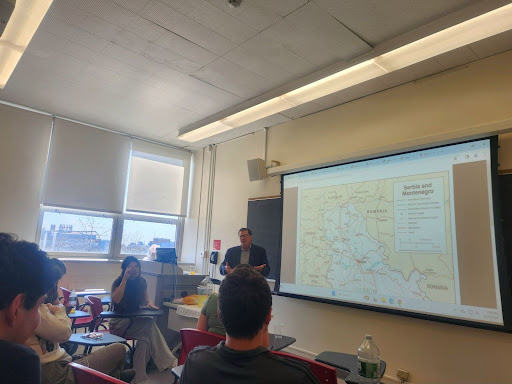I believe strongly in the concept of “academic freedom.” I’ve fought for it in my past columns this semester, urging both students and administrators to realize that professors should be allowed to teach and present all angles of a subject in order to foster an academic way of thinking.
What’s most disheartening for me, then, is when I hear about professors, especially ones here on campus, abusing this privilege.
For example, a friend of mine told me recently about his core English class last semester. Towards the end of the course, the adjunct professor, who I’ll leave anonymous, made the class read his own novel.
The book, which he published through a self-publishing online company in 2006, had received absolutely no critical praise or notoriety. Granted, a book doesn’t need to have won awards or been on a bestseller list to be a great read; but did this professor’s own novel tie in with the rest of the course?
According to my friend, it didn’t. In fact, it had nothing in common with the various world literatures the class had read prior.
Even worse, the students had to buy the book for nearly $25 and then write an open-ended paper critiquing the novel in some way. In many ways, this professor was serving himself for that part of the course, not serving the students.
Professors using their own books is nothing new. In fact, the practice is often highly beneficial – the professor knows the text better than anyone else and can easily base the course around it.
But for an English professor to teach his own novel in a global literature class and expect his students to give him feedback through a graded paper crosses a line. It’s just one example of how the academic freedom to choose a syllabus can be abused.
Similar situations have popped up at other college campuses. The Rutgers Daily Targum reported last year that Jeffrey Buechner, a Rutgers philosophy professor who teaches his own textbook in class, creates a new edition of his book each year and makes each student bring their copy of the latest edition into class to prove they purchased it.
“My impression is that he was trying to make money,” said one student in the Targum article.
Buechner, who teaches a Logic, Reasoning, and Persuasion course, has between 350 to 400 students each semester, according to the article.
The article was a follow up to a Rutgers University Senate report, released more than a year before, that attempted to quash this sort of thing.
“When Rutgers University faculty receive royalties on educational materials that they require in courses that they teach as part of the University curriculum,” says the report, “such monies should be donated to the University or other not-for-profit institution.”
Rutgers University did not institute this change to its procedure, but the university senate’s recommendation is certainly an interesting one; would a policy such as that effectively stop professors from unnecessarily assigning their own books to a class’s syllabus?
St. John’s has no such policy regarding professors using their own books in class. In fact, the University has no wide-sweeping policy at all about the way in which professors choose their syllabi.
Whether it would be effective or not, a policy such as the Rutgers suggestion could definitely be a step in the right direction.
Ultimately, professors deserve the freedom to choose their own texts for class, but that does not mean they will choose wisely, or even morally.
It’s up to us to ensure that our professors choose textbooks based on pedagogical merit. We should not be afraid to inform the heads of respective departments, even deans, if a professor is using a book for reasons that appear to be without academic merit.
It’s worth repeating: I believe strongly in the concept of “academic freedom.” But it’s a shame that some professors don’t seem to understand what that concept even means.















